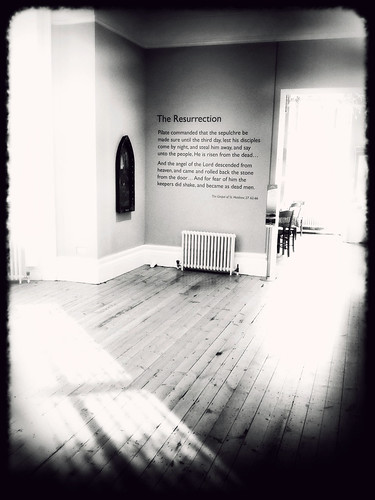Part one of this, the happenings for Good Friday, help set the context.
 The past few days have been crazy. I’ve dropped my emergency mobile running from a few officials – no major damage. I could have sworn that I heard that one of the brothers is dead. Not sure yet how, rumor has it that he left a message for those willing to read it. That would be too dangerous though, those officials are still looking for us and would definitely expect one of us to see what happened to our brother.
The past few days have been crazy. I’ve dropped my emergency mobile running from a few officials – no major damage. I could have sworn that I heard that one of the brothers is dead. Not sure yet how, rumor has it that he left a message for those willing to read it. That would be too dangerous though, those officials are still looking for us and would definitely expect one of us to see what happened to our brother.
The rest of us managed to find a room in relative obscurity. Due to our proximity to one another, we decided to just share four SIM cards between us, and let the other SIMs be used only in extreme emergencies. This has caused a problem with some of us who need to contact families, but I think that we’ll be ok if we can hold on a few more days.
Some of the women went down to the sepulchre. It was a very nice gesture Joseph did in granting Jesus his tomb. Surely the Lord will look well upon his gift – it already seems that brothers and sisters from neighboring towns have – offers of sepulchre’s and burial items have been pouring in by SMS all weekend.
Another beep. This time its only one of our mobiles. This doesn’t feel right. It is too early for the women to be sending us a message, hopefully nothing has happened to them. So few others outside of this room have that number. It can’t be good. A brother – bless his aggressive heart – picks up the mobile and looks at the MMS. His face looks pale. Then he droops and begins to sob. None of us dare want to break the silence by asking what he’d seen. He just throws the mobile on the table – a video clip playing.
I can see it from where I’m standing. There a cave, no, a tomb. Looks like the one they described as being the one donated by Joseph. However, its open. That’s not right. We can’t make out much, but it looks like the stone is moved, and there are no guards. Could the body have been… no, they wouldn’t do that. Would they?
Then the conversations start. We’ve got to see what’s going on there. Peter stands before us all cautioning that we’d be better off just waiting until the women return and then see what their report is. The message had to have come from them. Maybe they were just as surprised and shocked as we were.
A few minutes later the mobile beeps. This time just an SMS, and from the mobile held by the women. It was a short message, but stirred all kinds of emotions in all of us when it was read, “He is risen!” First one, then a few more started wailing. The pain of Jesus leaving just a few days ago, and how this – “He is risen” – what does it mean? Was he telling us the truth after all? Is this what it all meant?
A few hours later the women return. They are tired, but seem happier than anything. We asked them to explain, and they responded, “didn’t you get the message. He’s risen.” They go on to explain what happened when they got to the tomb. Its an unbelievable story to say the least. Peter runs out, he needs to see for himself obviously. The rest of us are sure, whether Jesus is risen or not, we’ve got to move. As soon as that news gets out, there are going to be even louder calls for our heads.
It had been three days since seeing my wife and family. I was glad to see them, hug them. And get some freshened clothing. Having some time, I also picked up my solar charger, and swapped SIMs with my wife. She’s got clear instructions not to use it until tomorrow. We’ve got to make sure that it doesn’t look suspicious that she’d changed numbers right now. I show her the message (“He is risen”) and she just beams. She doesn’t understand it much more than I, but she finds some relief in the message. I let her know that I’ve got to go for a few more days, but that I’ll be back. That embrace was hard. I really wasn’t sure if I’d see them again.
The brothers planned to meet near the place were ate with Jesus last. The keeper of that room also received the message from the women and assured us that we would be taken care of and fine there. We had to think and act quickly. And somehow, if Jesus is risen, get in contact with him. I’m sure that he couldn’t get a mobile – but I’ve seen him produce all kinds of things out of thin air, anything is possible with him.
The plans came along quickly. This was much different than in times past. It seemed like this time that we just wanted to be on one accord. Some of us reclined in our seats to breathe, some had been on the run a lot longer than just the past three days. Then something strange happened. The mobiles in the center of the table turned on at the same time, then vibrated, then turned off. That was weird, and we all seemed to see it at the same time. It got quiet, really quiet. Then, near the doorway, there was this voice, “Peace be with you.” I couldn’t believe my eyes. The face was right, and the body didn’t look anything like that battered person we saw on the official clip before the crucifixion.
Oh boy, it was him alright. I didn’t even have words. I was sorry for running, sorry for staying. I believed. I didn’t believe. And yet, there he was.
“Peace be with you,” he repeated. We all ran to embrace him but he stopped us. We couldn’t touch him? Weird, but he was there. Literally, right in our face. It hurt a bit that our mobiles didn’t work while he was there. It would have been great to send the wife footage of him eating with us and joking just like he used to. Weird how they didn’t work until he was gone. There was also some teachings that he gave. Teachings about things he taught before, which were a lot clearer now. I think I get it. The family won’t believe it, but I’ve got the means to explain it now.
Just as quickly as he showed, Jesus left. He still knows how to make an exit. This time though we’ve got some hope. Some of the brothers sat in a corner talking about the plans that we made earlier. Some things would have to change. We were confident that those changes would be for the better. If we are going to continue on the course that Jesus stared, we’d have to live life the way he did.
The only thing that was perplexing to me about the way he lived was that “gift” he kept referring to. What was that gift? And why was he so adamant about us receiving it?
 As surprised as I was when the news hit my mobile, there was still a lump in my throat. After the arrest, I knew that it would be a matter of time before they’d come looking for the rest of us. Thankfully, with the Passover in full swing, and the numbers in the city swelling, I could hide in a few places, and hopefully get the benefit of time causing some measure of forgetfulness. I only hope that the images we sent to the brothers weren’t intercepted.
As surprised as I was when the news hit my mobile, there was still a lump in my throat. After the arrest, I knew that it would be a matter of time before they’d come looking for the rest of us. Thankfully, with the Passover in full swing, and the numbers in the city swelling, I could hide in a few places, and hopefully get the benefit of time causing some measure of forgetfulness. I only hope that the images we sent to the brothers weren’t intercepted. This is a
This is a 





